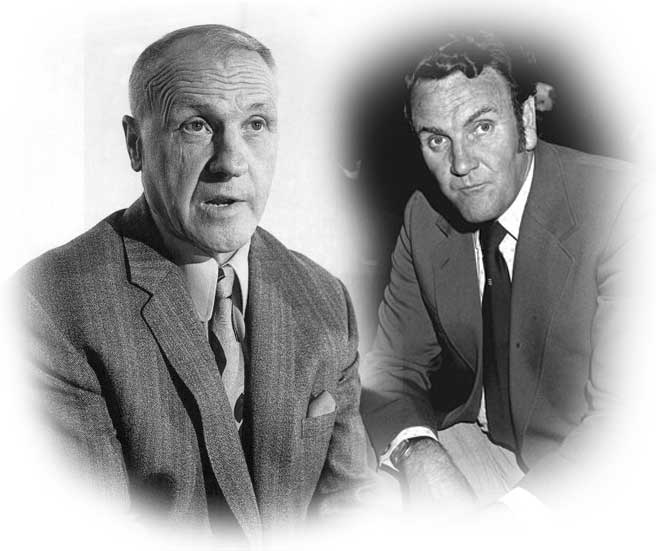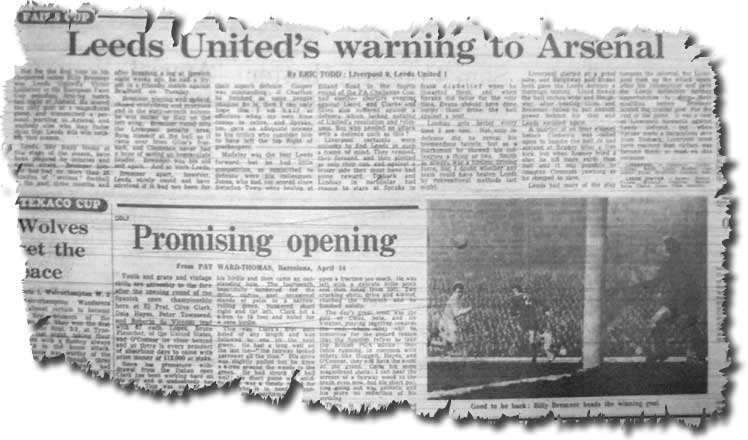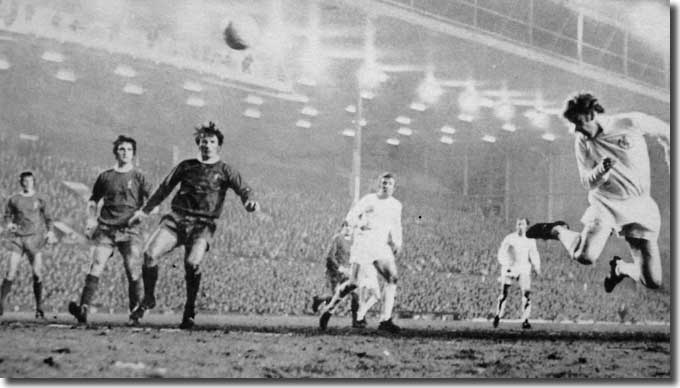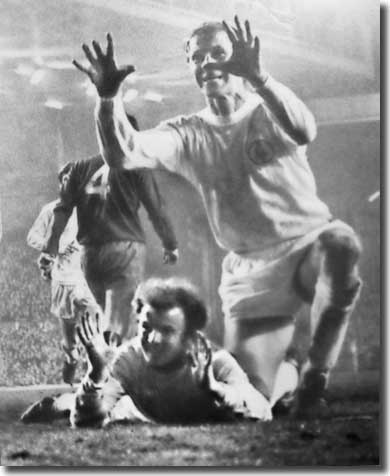 |
 |
 |
 |
 |
 |
 |
 |
 |
European Fairs Cup semi-final first leg - Anfield - 52,877
Scorers: Bremner
Liverpool: Clemence, Lawler, Lindsay, Smith, Lloyd, Hughes, Callaghan (Graham), Evans (Thompson), Heighway, Toshack, Hall
Leeds United: Sprake, Reaney (Davey), Cooper, Bremner, Charlton, Hunter, Bates, Clarke, Jones, Giles, Madeley
Shankly took Liverpool to the Second Division title in 1962
and saw them add the league championship in 1964, the
year that Leeds were crowned Division Two champions. The two clubs
met at Wembley in the 1965 FA Cup final, won
after extra-time by the Merseysiders, and from that point on the pair
were constantly vying for the game's honours. United confirmed their status as
league champions with a goalless draw between the two at Anfield in April
1969; from that point the Reds had been in transition. Bill Shankly
blooded a host of exciting youngsters, many of them snapped up for a pittance
from the lower divisions: Ray Clemence, Alec Lindsay, Larry Lloyd, Emlyn
Hughes, Steve Heighway, John Toshack, Alun Evans and Brian Hall had transformed
the look of the first-team as they replaced regulars like Tommy Lawrence,
Geoff Strong, Gerry Byrne, Willie Stevenson, Gordon Milne, Ron Yeats,
Roger Hunt and Ian St John. By contrast, of the Leeds team that played in the 1965 Cup
final, Sprake, Reaney, Bremner, Charlton, Hunter and Giles were still
regular first-teamers, and most of their newcomers had come through the
youth ranks at Elland Road, though Allan Clarke and Mick Jones were big
money imports. The two northern giants were drawn to meet each other at
the semi final stage of the European Fairs Cup competition in 1971, guaranteeing
England at least one berth in the final of the tournament, its final staging
before reconstitution as the UEFA Cup the following season. It was a mouth watering pairing and both Revie and Shankly
declared their satisfaction with the draw. For both clubs, the Fairs Cup
represented one part of a potential double: Leeds were racing neck and
neck with Arsenal in their perennial pursuit of the League championship,
while Liverpool would face those selfsame Gunners in the FA Cup final
at Wembley. Peter Lorimer was unavailable for selection after injuring
a hamstring in the weekend's draw at Huddersfield, but Revie had the significant
consolation of being able to recall skipper Billy Bremner for his first
appearance since 23 February. For the Scot, the season had been one long
injury nightmare. Bremner had managed only 25 minutes' first team football
in three months. He had struggled through the autumn with damaged knee
ligaments, then suffered an ankle injury against Rotherham in early January
before sustaining a hairline fracture in his left leg when making his
comeback. In reaching the semi-inal stage, Leeds had strolled past
Sarpsborg and Sparta Prague, though Dynamo Dresden (beaten on away goals)
and Vitoria Setubal proved more durable. For their part, Liverpool had
edged past Ferencvaros, before facing easier hurdles in Dinamo Bucharest,
Hibernian and Bayern Munich. But for both teams, this was the acid test,
a winners take all tussle that would test the victors to the limit. United were considered marginal favourites, despite going
into the game on a run of just one victory in five games. The challenge
of a visit to Anfield for the first leg, however, was a stern one. When
Leeds won 1-0 on Merseyside in December 1965 it was the club's first victory
at the ground since 1932, while Paul Madeley's goal in the 1-1 draw in
December 1970 was the first scored by a United player at Anfield in five
years. Bremner's first action of the night turned out well: he
won the toss and decided to defend the Kop end in the first half, a tactical
gamble designed to undermine any second half surge from the Reds. Liverpool were undefeated at home all season and keen on
maintaining that record; they enjoyed the better of the early moments. Tom German in The Times: 'At the start Leeds looked
uncertain and Heighway and Hall, sharp and searching, led the quest for
a quick breakthrough. Little more than an astute hook was yielded by Lloyd,
which sailed only a foot or so wide, and a header by Heighway which Sprake
was safely positioned to collect. Perhaps Leeds decided that Liverpool's
fangs were less fearsome than they looked; at any rate, the Yorkshiremen
began to move the ball around with growing confidence and Bremner found
his sea legs, so to speak, and Cooper and Giles began to thread their
way forward. 'Suddenly it was a real contest and Leeds were the ones
who appeared the more likely to shape it. Madeley almost did as Giles
and Bremner struck up that old understanding to open the way for Madeley
whose shot was turned over the bar superbly by Clemence's upstretched
arm.' Bremner had appeared in a friendly against Bradford 24 hours
earlier in a bid to prove his fitness, and understandably he took a while
to get going. But after he had found the pace of the game he made a decent
contribution. Despite Liverpool's early dominance, it was 17 minutes before
they were able to create an opening, Evans failing to get his head to
a fine centre from Ian Callaghan. United responded instantly, with Clarke putting the ball
past Clemence, though the effort was chalked off for offside. Goalkeeper Sprake injured his back early in the game and
was handicapped considerably thereafter, but he defied his pain to show
good form, making fine saves from Lawler, Lindsay and Highway as battle
was joined in earnest. Leeds, though, rose to meet the challenge and after 25 minutes
were unlucky not to take the lead. Bremner got possession after a long
drive from Giles and fed Madeley. Clemence did well to save his shot. It was nip and tuck from then on, with United playing mostly
on the break, but they looked solid and steady at the back with the rearguard
in fine form. There was still no goal and not much sign of a breakthrough
by the time the game reached the break. It looked like Shankly had given the Liverpool players a
real flea in the ear during the interval for they went at Leeds with renewed
vigour after the resumption. Alun Evans fluffed the chance of the night
when Toshack's quick centre left him unmarked five yards from goal. Incredibly,
he could only find the upright as the opportunity went begging. Leeds were more calculating with their openings. After 67
minutes it was they who opened the scoring. Bremner, who had played in
an advanced role throughout the contest, drew a foul wide on the right
and was waiting in the area when Giles fired the free kick into the area.
It bypassed all the Liverpool men and sailed invitingly toward Bremner,
who leapt to nod it home with a flick of his red head, hushing the passionate
home crowd. Bremner's joyous colleagues raced to congratulate their
restored leader. Barry Foster in the Yorkshire Post: 'The feelings
of the whole Leeds side were epitomised by Charlton who ran 30 yards with
his hands waving joyfully in the air to pick up and congratulate his captain.' It was the 100th goal scored by Leeds in the campaign and,
fittingly enough, it came in United's 50th Fairs Cup-tie; that landmark
had been reached in just five seasons' worth of competition, an astonishing
tribute to their The goal was the signal for Liverpool to throw themselves
into all out attack. They brought on Graham and Thompson for Callaghan
and Evans, pepping up their forward line, and penned United back in their
area. Sprake preserved the lead with a wonderful save after seventy minutes
from Toshack. Then Hunter cleared a Lloyd shot off his goal line. Liverpool continued to press for an equaliser and might
well have manufactured it if they had been cooler in front of goal. Heighway put Hughes through but he got the ball tangled
up between his feet and Sprake combined with Jack
Charlton to snuff out the danger. Eric Todd in The Guardian: 'Leeds surely could not
have survived if it had not been for their superb defence. Cooper was
outstanding; if Charlton is finished, as some people imagine he is, then
I can only hope that I am half as effective when my own time comes to
retire, and Sprake, too, gave an adequate answer to his critics who consider
him to have left the top flight of goalkeepers. 'Madeley was the best Leeds forward, but he had little competition,
so committed to defence were his colleagues. Jones, who had not scored
since Swindon Town were beaten at Elland Road in the fourth round of the
FA Challenge Cup, had another abortive evening, against Lloyd, and Clarke
and Giles also suffered against a defence which lacked nothing of United's
resolution. But who needed an attack with a defence such as this? 'Liverpool certainly were unlucky to find Leeds in such
a frame of mind. They harassed, they foraged and they plotted as only
they can, and against a lesser side they must have had some reward. Toshack
and Lindsay in particular had reason to stare at Sprake in frank disbelief
when he thwarted them, and when Sprake did falter for the only time, Evans
should have done better than drive the ball against a post. 'Lindsay gets better every time I see him. Not only in defence
did he reveal his tremendous talents, but as a marksman he showed his
colleagues a thing or two. Smith as always was a tireless driving force,
but I doubt whether Don Warters in the Yorkshire Evening Post: 'Victory
came at a time when people were beginning to doubt whether Revie's men
had the resilience and character to last out what has been another exhausting
season. Few people at Anfield gave United a chance before the game and
Liverpool supporters are among the most knowledgeable in the game. 'A better way to hit back at the doubters than a win at
Anfield is difficult to imagine. Leeds are always at their best when the
chips are down and a draw last night would have satisfied manager Don
Revie. 'There was little doubt in my mind that United, in spite
of Liverpool's hustle and bustle up front, deserved their victory. They
had the edge on Bill Shankly's jumping wonders which made them the first
team to win at Anfield in 12 months, ending a 30 match unbeaten home sequence. 'It was Leeds at their commanding best with every man playing
his part. In defence, Hunter, Charlton and Cooper were towering figures
and Sprake, injured early on and hampered for the rest of the game with
back trouble, brought off several splendid games, the best coming in the
70th minute to a header from Toshack. 'Giles, Madeley and Bates worked hard in midfield for United
and up front Clarke, Jones and Bremner never stopped trying.' It was a triumph for Revie and his men: the gamble of recalling
Bremner paid handsome dividends and despite not being at his best and
lacking in match fitness, his presence was enough to inspire his colleagues
to one of their classic away performances. It took him 20 minutes to come
to terms with the pace of the game but then he grew more and more influential.
In the final verdict it was as if he had never been away. United denied their old rivals the victory they needed so
badly before a crowd of almost 53,000 fanatical fans, but, as Bill Shankly
grumbled afterwards, 'If you miss chances like we did you do not deserve
to win.' Leeds were not yet through to the final, and would be hard
pressed to preserve their advantage in the second leg at Elland Road.
Nevertheless, they had taken a massive step towards a third Fairs Cup
final and in the process given themselves a massive confidence boost for
their league run in. There
is a long and healthy tradition of respect and fierce rivalry linking
Liverpool and Leeds United; it dates back to the days when Bill Shankly
and Don Revie revived the fortunes
of the two clubs and led them from the wilderness of Second Division football
to the top of the European game.
There
is a long and healthy tradition of respect and fierce rivalry linking
Liverpool and Leeds United; it dates back to the days when Bill Shankly
and Don Revie revived the fortunes
of the two clubs and led them from the wilderness of Second Division football
to the top of the European game. It
was clearly a gamble to recall the Scot for such a vital match, but Revie
would always select a barely fit Bremner ahead of many other players who
were 100%; the captain was a totem for United and had a track record of
snatching decisive goals in big games. As Don Warters wrote in the Evening
Post, 'Leeds have managed quite well without Bremner over the past
months but there is no doubt that the Scot's presence is a psychological
boost for the side.'
It
was clearly a gamble to recall the Scot for such a vital match, but Revie
would always select a barely fit Bremner ahead of many other players who
were 100%; the captain was a totem for United and had a track record of
snatching decisive goals in big games. As Don Warters wrote in the Evening
Post, 'Leeds have managed quite well without Bremner over the past
months but there is no doubt that the Scot's presence is a psychological
boost for the side.' consistency in the tournament.
consistency in the tournament. any team could have beaten Leeds by conventional methods last night.'
any team could have beaten Leeds by conventional methods last night.'